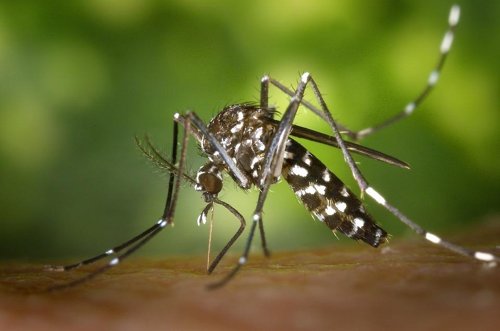The rainy season always brings with it a number of maladies, and dengue is among them. Dengue is a serious tropical disease brought by Aedes aegypti mosquitoes during the wet season. Mosquitoes are actually among the most pestilent insects in the world, causing more affliction than any other organism. Over one million people around the world die from mosquito-borne diseases every year, and many more suffer. What is disturbing about dengue is that it is often mild, with symptoms showing only five to eight days after a person is bitten. The signs of the illness are often unnoticeable, especially when the virus is not too strong. In severe cases, however, such symptoms like nausea, vomiting, swollen glands, pain behind the eyes, muscle pain, and skin rashes manifest. Otherwise, the infected person just experiences a fever, a headache, and loss of appetite.

Photo courtesy of WikiImages via Pixabay
Until now, there is no medication or vaccine to cure dengue. Prevention is still the best way to stop it from spreading. Keeping your family safe from viral disease is the responsible thing to do, so if you haven’t employed any precautionary measures yet, here are some dengue prevention tips to help you get started.
- Environmental consciousness: Clean your surroundings

Photo courtesy of Pezibear via Pixabay
Ideally, cleaning your condo or house should be a routine. Mosquitoes breed in unhygienic places that have a collection of excess water. Pails, buckets, pots—they can all potentially be breeding grounds for these infected insects. Check every container around your home, and empty everything that contains even the smallest amount of water. Those that can’t be overturned or emptied should be covered when not in use. If you have a cooler or a water tray, it’s best practice to empty out the tray regularly and have it cleaned. Even flower vases should not be spared from this. Mosquitoes can breed where there is excess water, so don’t overwater the plants inside your unit. Also, keep the balcony and the bathroom clean. There is nothing that dengue mosquito’s love more than an unsanitary environment. If you live in a vertical community, you shouldn’t worry about the condo facilities because the management takes care of the common areas.
- Safety from bites: Use mosquito repellents

Photo courtesy of MeHe via Pixabay
You’ll find many practical tips to avoid dengue from spreading in your home. The easiest and most obvious of them all is to apply a coat of mosquito repellent all over your body, especially on exposed areas. Repellents that contain a chemical known as DEET are the most ideal because they repel mosquitoes the most. Another repellent that you can try is camphor. Unlike DEET, camphor is not designed to be directly applied to the skin. Instead, it needs to be lighted up in a room with closed doors and windows. There is something about the smell of camphor that drives mosquitoes away. Using camphor to ward off mosquitoes is an effective home remedy. All you have to do is light it and leave it for 15 to 30 minutes in a closed space, and your mosquito problem will be solved.
- Community awareness: Participate in social activities

Photo courtesy of Unsplash via Pexels
Social mobilization is a key part in preventing and controlling the spread of dengue. The Department of Health in the Philippines has announced June as Dengue Awareness Month, and many organizations are adopting community-wide activities to support this health campaign. An example is Riverfront Residences, which is active in sponsoring programs related to preventing the spread of dengue. To help stump the spread of this mosquito-borne disease, you can participate in some activities organized in your community. The fight against dengue is real. In fact, the latest report by the World Health Organization revealed that in 2015, the Philippines saw 169,000 cases of dengue—that’s a 59.5% increase from 2014. Through the collective efforts of the community, dengue can be stopped. Everyone just needs to get on board.
- Physical safeguard: Install nets and screens

Photo courtesy of MartinezCodina via Flickr
To give your family full protection against dengue even when they’re asleep, you can use mosquito nets at night or even during the day. Velcro mosquito nets are available in commercial establishments so you can easily get one. Also, it will be wise to install a screen on your windows. This will keep the mosquitoes out of your home. If your old window screen is tattered, cover the holes with a tape, or better yet, get a new set of window screens. Even if your home is not a breeding ground for mosquitoes, you can still get infected by the dengue virus if mosquitoes from outside can enter your home, so invest in a physical barrier that can block those mosquitoes out.
- Green protection: Go for natural methods

Photo courtesy of Kunal Chowdhury via Flickr
There are many natural ways to prevent dengue. The simplest of them is the use of kitchen ingredients like basil, garlic, and mint. A basil plant has properties that inhibit mosquitoes from breeding. Place a potted basil near your windows to ward off mosquitoes. Garlic is also effective to some extent. Its strong, pungent smell can prevent mosquitoes from lingering too long inside your home. You can make your own garlic extract by boiling a few cloves of garlic. Spray the extract around the room and watch as mosquitoes either scurry away or die. This home remedy is not very popular for an obvious reason: the smell of garlic is not exactly that pleasant. Still, garlic extract as a mosquito spray is worth a try for the sake of safety. Another natural remedy that you can use is mint. You can either plant a mint shrub on the entry points of your house like the doors and windows, or you can spray mint oil on the parts of your body that are most exposed.
- Oil treatment: Harness the power of essential oils

Photo courtesy of Devanath via Pixabay
Essential oils such as lavender, tea tree, and lemon eucalyptus are also effective in warding off mosquitoes. Lavender has a strong smell that mosquitoes just can’t tolerate. Spray lavender oil around the house or burn it with an oil lamp to keep mosquitoes away. You can do the same to tea tree oil because it also has antibacterial and antifungal properties that can fend off mosquitoes. Like lavender, you can either spray it or burn it. Another oil that you can use is extracted from lemon eucalyptus. This kind of oil is comparable to DEET, only a little less strong. Just a word of caution: you should not use lemon eucalyptus oil if there are children in your house that are under the age of three.
When it comes to your family, health is always a priority. Diseases like dengue do not choose their prey. If you don’t take precautionary measures, your family may be the next victim of this vicious disease. Try out the tips outlined above to fully safeguard your family from dengue.
Author
Jeanette Anzon is the writer and editor for AdventureDweller.com. She mostly write about home improvements, home guides and designs, and real estate investments.




Recent Comments